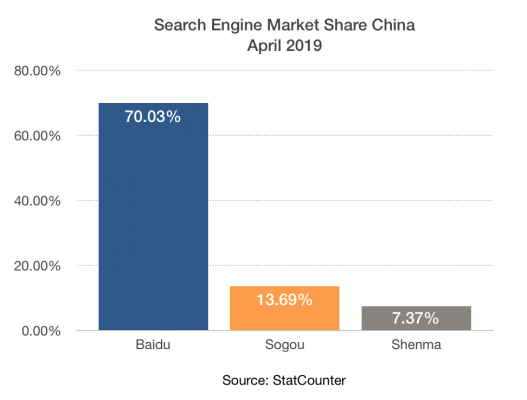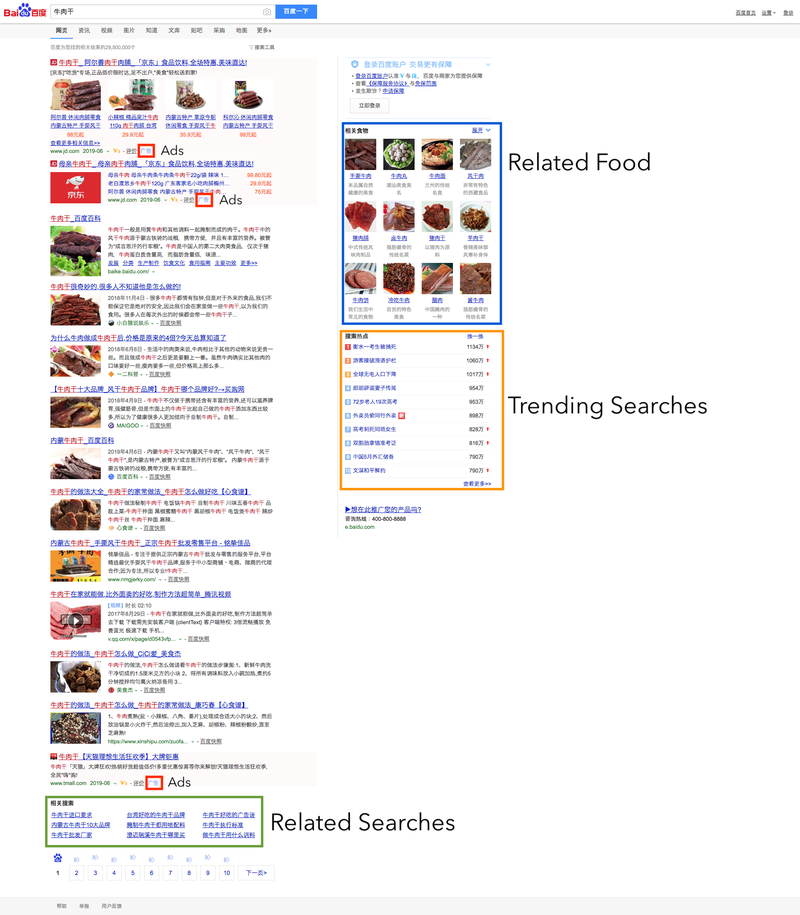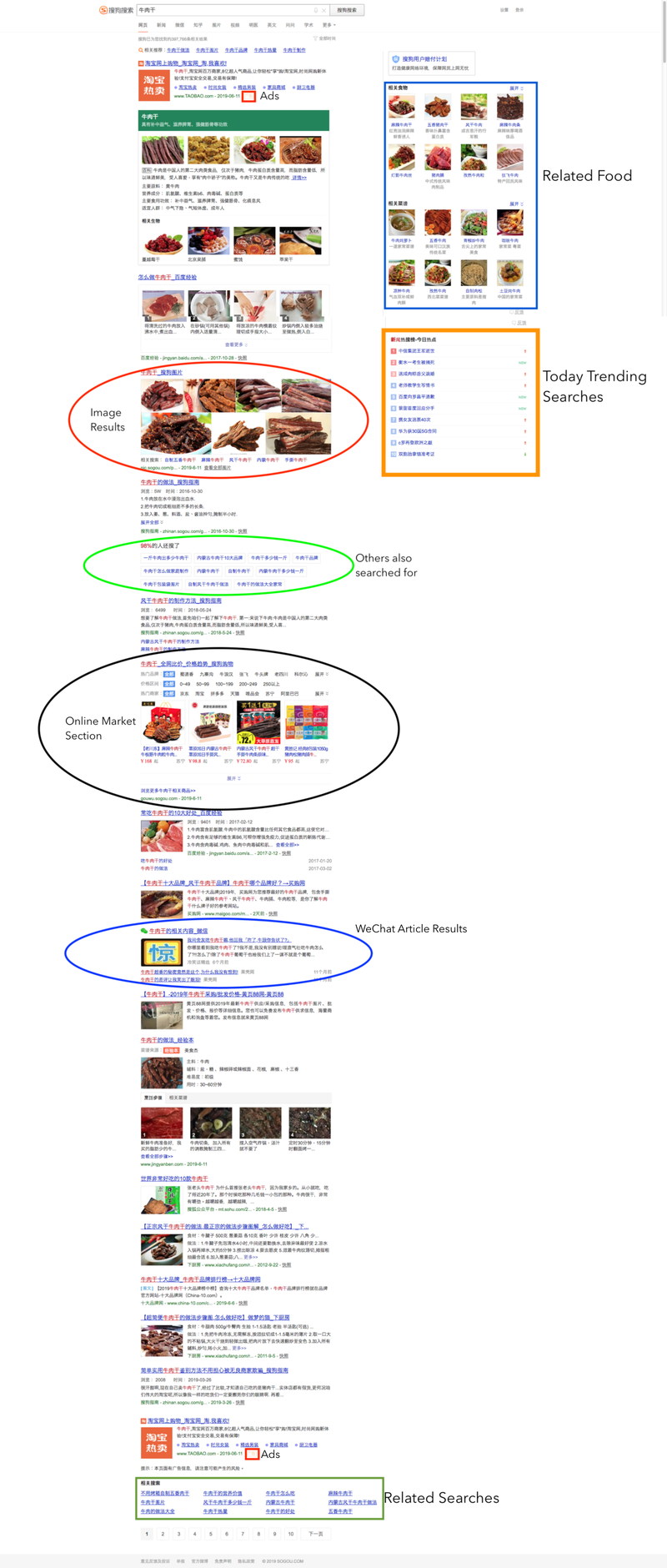Our new series on navigating China’s web without “special software”
You may be stuck behind the firewall, but that doesn’t mean you can’t enjoy it. Walled-Off is a new series explaining how to navigate—and take advantage of—the domestic web without the use of certain “special software.”
Getting around the Great Firewall is increasingly harder these days, with sensitive anniversaries and all-round tightening upping the frequency of dropped connections, time-outs, nixed servers, and all the usual bugbears.
For those without a premium VPN, adapting to China’s internet can have potential fringe benefits, such as improving Chinese language skills, getting up-to-date with local trends, and taking advantage of the multiple e-commerce opportunities. Let’s start with one of the basic tools: search engines.
Which Engine?
Since today is the second Thursday of June, also known (by some, we guess) as Jerky Day, we tried out some searches for beef jerky (牛肉干, niúròugān) using China’s top three search engines to see which delivers the best results.

Baidu’s dominance in the domestic search sector (source: StatCounter)
Despite a its recent PR problems, Baidu is still China’s biggest search engine. Clicking on Baidu’s logo on their home page will automatically search for 今日新鲜事 (“Today’s fresh happenings”), which shows trending topics and videos, a “This Day in History” snippet, and other news sites. Although the interface is in Chinese, you can get make the query in another language and click on 英文结果 (“English results”), which will give results mostly in English but occasionally in another language.

Baidu yields plenty of relevant results. Notice the link with a 广告 (advertising) icon—these sponsored results are the ones to click when you’re looking to buy some jerky online (though not when you’re seeking advice on the best cancer treatment).
Directly following the ads is the entry on 牛肉干 from Baidu Baike, Baidu’s version of Wikipedia. Below Baike are results from other sites, ranging from “how to make beef jerky at home,” “Inner Mongolia’s beef jerky”, to “why beef jerky is four times the price of beef.”

Marked in green at the bottom, the 相关搜索 offers alternative search keywords, which the engine will search when clicked; in this case, these includes “requirement to import beef jerky,” “top 10 Inner Mongolian beef jerky brands,” and “ingredients needed to make beef jerky.”
On the right-hand side, marked in blue, are results for related food, ranging from hand-shredded beef, meatballs, pork and lamb jerky; clicking these will forward users to a new Baidu search. Finally, marked in orange, are 搜索热点 (“hot topic searches”), an index of recent trending searches in Baidu according to rank and search hit.
Better known for their popular pinyin-input software Sogou Pinyin, Sogou (搜狗, “Search Dog”) is the second-largest search engine in China. It’s backed by Tencent and integrated with many Tencent products such as QQ and the WeChat in-app search function. Significantly, it is the only search engine that can search within articles published by WeChat public accounts.

Like Baidu, the first Sogou result (after the Taobao ad) is a Sogou Baike entry followed by a step-by-step recipe and image search results. Sogou also showed us jerky-related things that 98 percent of users have searched for.

There is also a small section midway down where jerky from various online shops are aggregated; users can filter them by by brand, price, or shopping platform. The section of results from WeChat public accounts are preceded by a small WeChat logo, .
You have never probably heard of Shenma (神马, “Divine Horse,” a wordplay on 什么 shénme, meaning “what”), but this mobile-only engine is the third most popular in China. Jointly launched by Alibaba and UCWeb, Shenma is the default search engine for UC Browser, a popular mobile browser. Interestingly, searching for images through Shenma requires first clicking on the 更多 (“More”) tab and selecting 图片 (“Image”) in a drop-down menu, which will redirect you to…Bing image search.

Being mobile-only, Shenma offers horizontal scrolling and splits results into categories. Like their competitors, the top result is 牛肉干 snippet from Shenma Baike.


Since there’s no sidebar, the 相关食物 section can be reached by horizontal scrolling. Since Shenma is partly owned by Alibaba, its little wonder that Taobao ads are integrated into results—and not explicitly marked as advertisements. The remaining results are combined into sections, including jerky recipes, popular brands and videos.
For users determined to stay in the Anglosphere, there are a few non-Google options:
Microsoft’s beleaguered Bing has been the to-go tools for many expats in China when they need to find information on the web without a VPN. The search engine has an International (English) and Chinese version. It was briefly blocked earlier in the year, but remains a fairly stable choice.
Based in Berlin, Ecosia offers an environmental incentive, donating a portion of their ad revenue to non-profit organisations that focus on reforestation and environmental conservation. According to their website, they “use Bing’s search technology, enhanced with Ecosia’s own algorithms.” So, basically Bing, but greener.
SearX is metasearch engine, aggregating the results of other search engines. Users can also choose to view results from a particular engines that SearX aggregates from.
An English version of Sogou that combines result from Bing and Sogou; like Shenma, Sogou English’s image search are from Bing.
Finally, here are translation of common search engine terms:
网页 (wǎngyè): Webpage; this is usually the default tab for search results
图片 (túpiàn): Image
视频 (shìpín): Video
新闻 (xīnwén) or 资讯 (zīxùn): News
更多 (gèngduō): More; usually shows a small drop-down menu with more result categories.
相关 (xiāngguān): Related/Relevant; often accompanied by a noun, depending on the query (e.g. 相关搜索 Xiāngguān sōusuǒ “Related Searches,” 相关词语, Xiāngguān cíyǔ, “Related Keywords” or 相关食物, Xiāngguān shíwù, “Related Foods”)
广告 (guǎnggào): Advertisement; sponsored results may have 广告 next to the link…but not necessarily
Cover image from Pixnio












